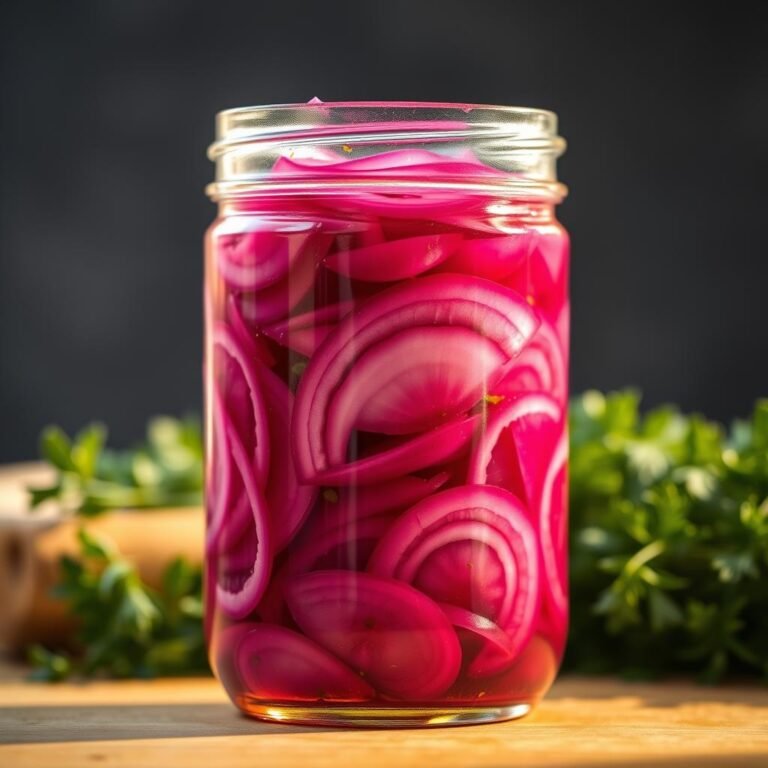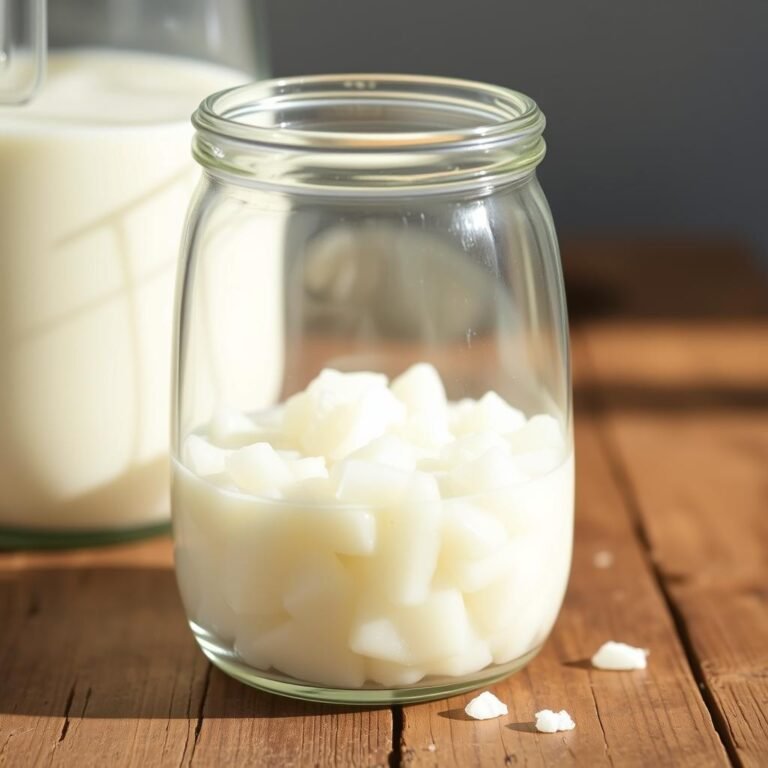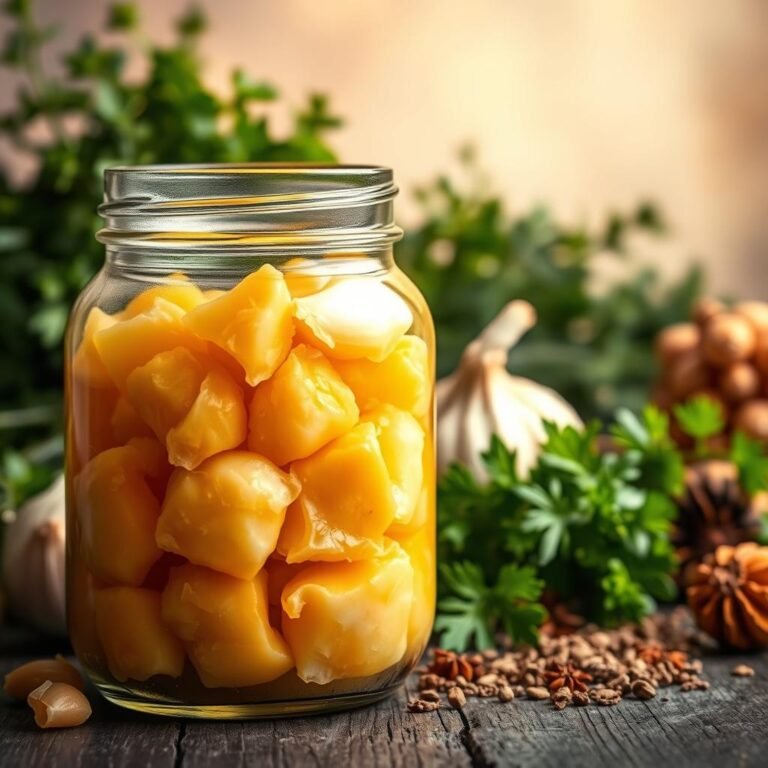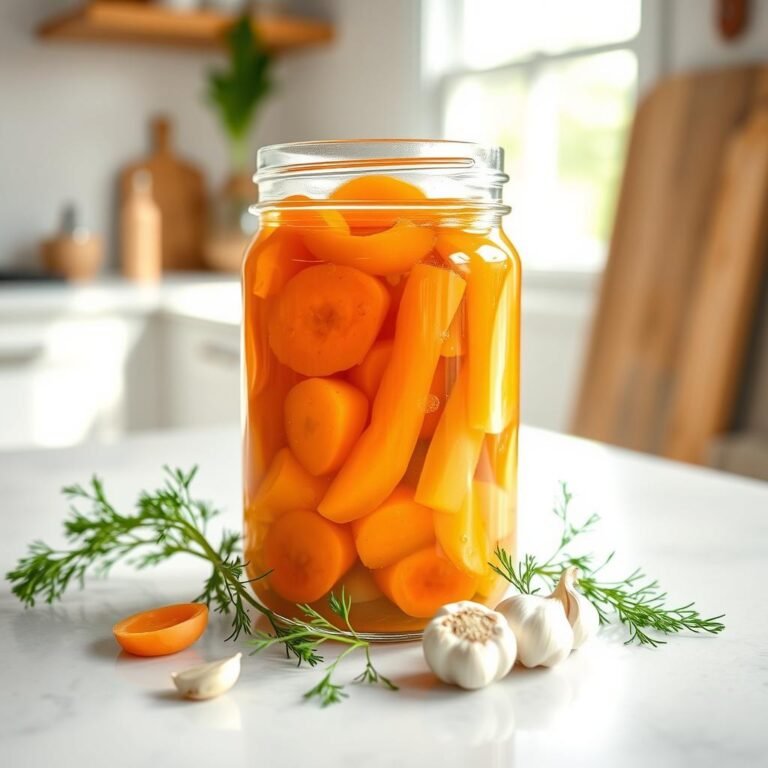Top 10 Lactobacilli Foods to Eat for A Strong Gut and Immunity
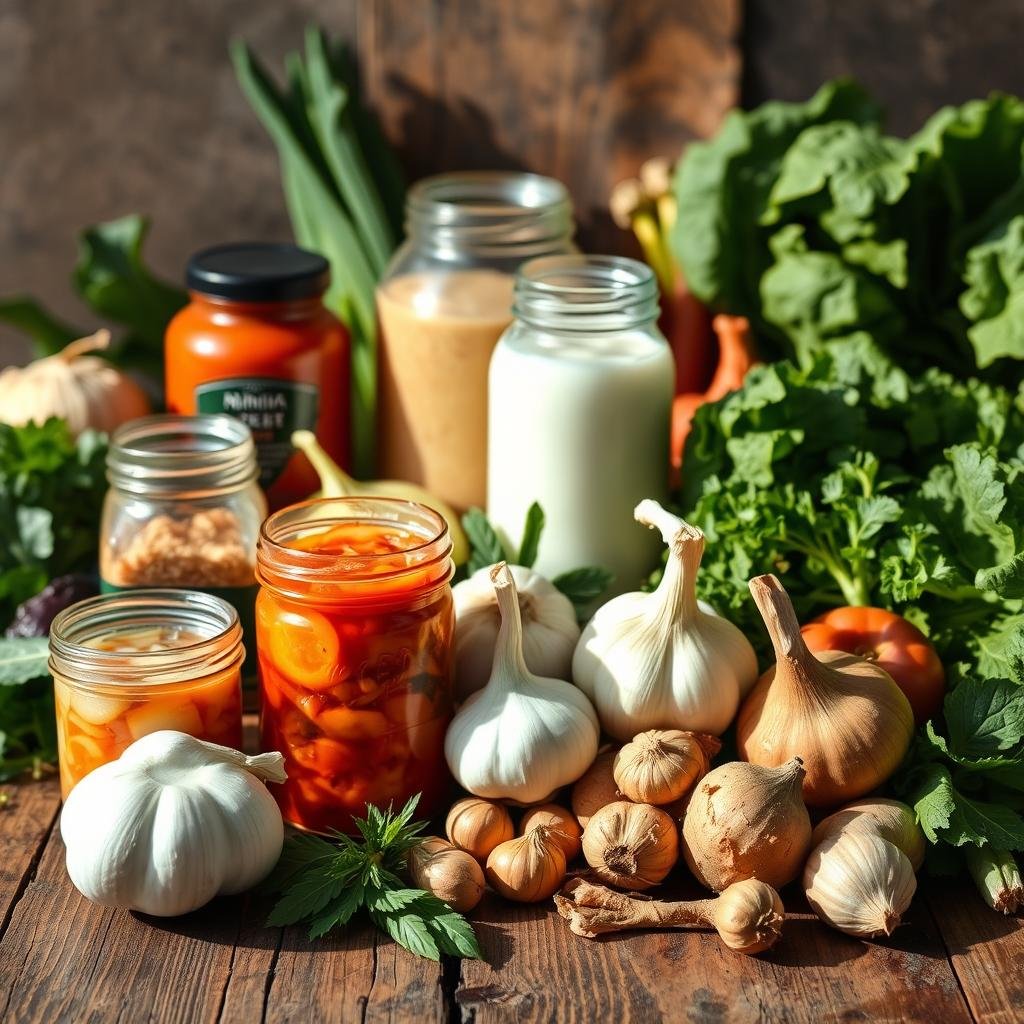
Eating gut-friendly foods is key for good health. Foods rich in lactobacilli help a lot with digestion and immunity. Adding fermented foods with lactobacilli to your diet can make your gut and immune system stronger.
This guide shows the top 10 lactobacilli foods you should try. You’ll find everything from yogurt and kefir to kimchi and sauerkraut. Learn how these foods can boost your health and how to add them to your meals.
What are Probiotics and Lactobacilli?
Learning about probiotics and lactobacilli can really help our health. Probiotics are live microorganisms that give us health benefits. They help keep our digestive system healthy and boost our immune system. Lactobacilli are special because they help keep our gut balanced.
Definition of Probiotics
Probiotics are live microorganisms that help us when we eat them. They are found in fermented foods and supplements. They help keep our gut healthy and improve our overall wellness.
Role of Lactobacilli in Gut Health
Lactobacilli are important for a healthy gut. They keep the good bacteria in our gut balanced. They also help us digest food better and absorb nutrients.
Benefits of Consuming Lactobacilli
Eating foods with lactobacilli is very good for us. They help with digestion and prevent infections. They also make our skin better and can even help our mood. Eating foods with these good bacteria can make us healthier.
The Importance of a Healthy Gut Microbiome
A healthy gut microbiome is key for our overall health. It affects digestion and our immune system. It’s filled with different kinds of microorganisms that keep us healthy. Eating foods with healthy gut bacteria is important for a balanced gut.
Overview of Gut Microbiome
The gut microbiome is home to trillions of tiny living things. These include bacteria, viruses, fungi, and more. They help us digest food, make vitamins, and fight off bad bacteria. Eating foods with lactobacilli helps keep the good bacteria in balance.
Impact of Lactobacilli on Digestive Health
Lactobacilli are good for our digestive system. They help break down food and absorb nutrients better. They also make lactic acid to stop bad bacteria from growing. Adding lactobacilli foods to your diet can make your digestion better.
Immunity Boost from Lactobacilli
Lactobacilli do more than help with digestion. They also boost our immune system. They work with our immune system to keep us healthy. Foods with lactobacilli help keep our immune system strong, fighting off sicknesses.
Yogurt: A Staple of Probiotic-Rich Foods
Yogurt is a top pick for foods with live cultures. It boosts gut health and strengthens your immune system with natural probiotics. It’s a healthy and flexible food for any diet.
Health Benefits of Yogurt
Yogurt is good for your health in many ways. It has natural probiotics that help your gut work right. This is key for digesting food and getting nutrients.
Yogurt also helps your bones, heart, and may lower the risk of diseases like diabetes and cancer. It’s great for people with lactose intolerance too, as it has enzymes to help digest lactose.
Choosing the Right Type of Yogurt
It’s important to pick the right yogurt for the best health benefits. Choose yogurts that say “live” or “active” cultures. These have the live cultures your gut needs.
Also, pick yogurts with little added sugar to avoid extra calories. Greek yogurt is a top choice because it has lots of protein. It’s perfect for those looking to eat more protein.
| Type of Yogurt | Key Benefits |
|---|---|
| Greek Yogurt | High protein content, contains live cultures, minimal added sugars |
| Plain Yogurt | Contains natural probiotics, versatile in cooking and baking |
| Non-Dairy Yogurt | Suits lactose intolerant individuals, often fortified with probiotics |
Kefir: A Powerful Probiotic Drink
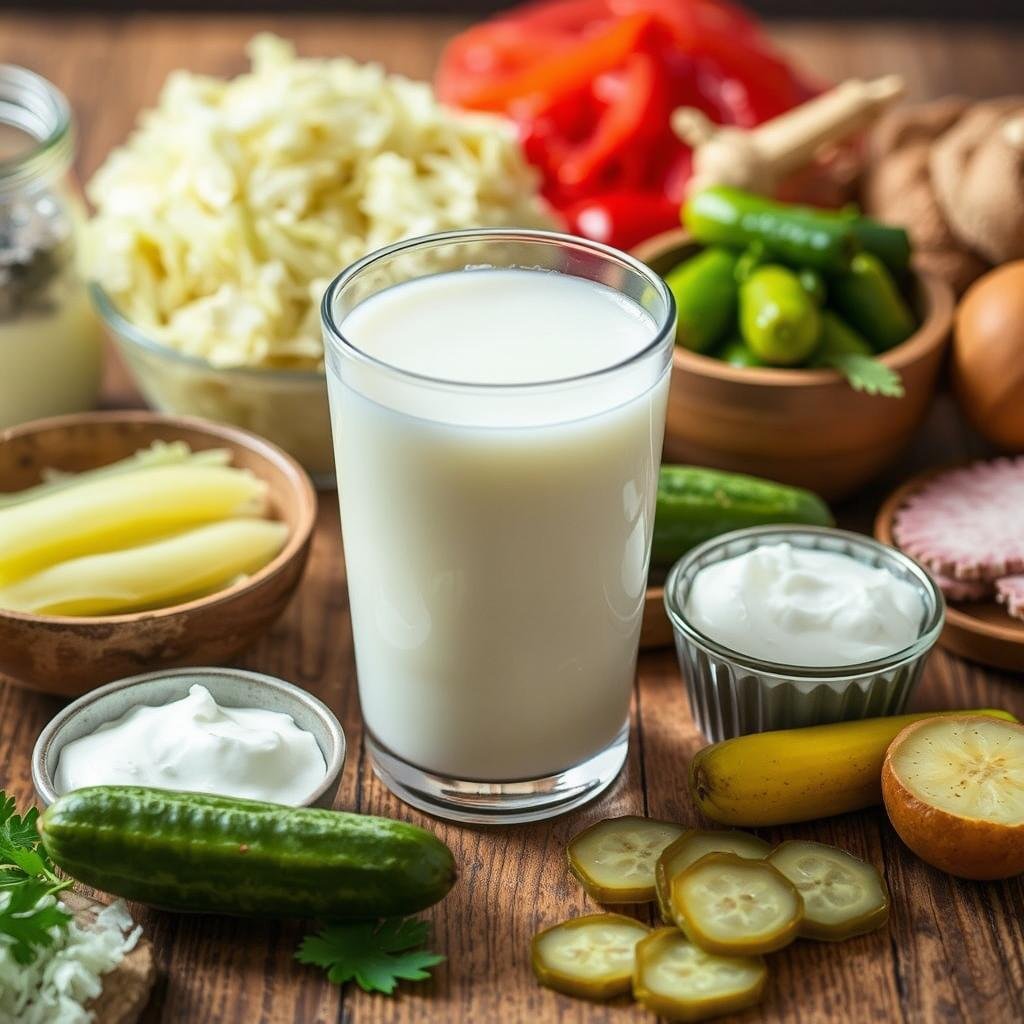
Kefir is a special drink made from fermented milk. It’s packed with lactobacilli, which are good bacteria. Unlike yogurt, kefir has more types of beneficial bacteria and yeasts.
This drink helps your digestive system a lot. It has lots of probiotics. A 1 cup of low-fat kefir gives you:
| Nutrient | Amount |
|---|---|
| Protein | 9 grams |
| Calcium | 36% of the DV |
| Phosphorus | 20% of the DV |
| Vitamin B12 | 29% of the DV |
| Riboflavin (B2) | 25% of the DV |
| Magnesium | 7% of the DV |
| Vitamin D | 12% of the DV |
| Calories | 104 |
| Carbs | 11.6 grams |
| Fat | 2–3 grams |
Kefir’s probiotics can fight off bad bacteria. This helps keep your gut healthy. It also helps your bones by making calcium absorption better. This might lower the risk of osteoporosis.
For those with digestive problems, kefir can help. It may ease diarrhea and irritable bowel syndrome.
Kefir is good for people with lactose intolerance. The fermentation process lowers its lactose. This makes it easier to digest for those who can’t handle lactose well.
Some studies say kefir might even help fight cancer. It could stop tumors from growing.
In short, kefir is a top choice among fermented foods. It’s full of nutrients and probiotics. It’s great for improving gut health and overall well-being.
Sauerkraut: Fermented Cabbage for Gut Health
Sauerkraut is a fermented cabbage dish great for gut health. It’s full of nutrients, antioxidants, and probiotics. These are key for a healthy gut.
Nutritional Profile of Sauerkraut
Sauerkraut is packed with fiber, vitamin C, and vitamin K. Each cup (142 grams) gives you:
| Nutrient | Amount |
|---|---|
| Calories | 27 |
| Fat | 0.2 grams |
| Carbs | 6.1 grams |
| Fiber | 4.1 grams |
| Protein | 1.3 grams |
| Sodium | Significant source |
| Vitamin C | Significant source |
| Vitamin K1 | Significant source |
| Iron | Significant source |
| Manganese | Significant source |
| Vitamin B6 | Significant source |
| Folate | Significant source |
| Copper | Significant source |
| Potassium | Significant source |
Sauerkraut has up to 28 bacterial strains. These probiotics fight toxins and harmful bacteria. It’s a top probiotic food.
How to Include Sauerkraut in Your Diet
Adding sauerkraut to your meals is easy and tasty. Choose unpasteurized sauerkraut for more probiotics. Here’s how to use it:
- Serve as a flavorful side dish with sausages and meats.
- Add to sandwiches and burgers for a tangy crunch.
- Mix into salads for an extra probiotic boost.
- Top baked potatoes or roasted vegetables for added flavor.
Regularly eating lactobacilli foods like sauerkraut helps your gut and immune system. Learn more about sauerkraut’s benefits here.
Tempeh: A Fermented Soy Product
Tempeh comes from Indonesia and is loved for its nutrition and flexibility. The fermentation process makes it better by cutting down on phytic acid. This acid can block mineral absorption in the body.
Tempeh is packed with protein, making it great for vegans and vegetarians. The fermentation helps with digestion and adds good bacteria. This makes tempeh a top choice for improving gut health naturally.
Tempeh is also a rare plant-based source of vitamin B12. This vitamin is usually found in animal products. It’s a big plus for those eating only plants, ensuring they get all the nutrients they need.
Tempeh can be steamed, grilled, or stir-fried. It’s easy to add to many dishes. Its growing popularity in the US shows it’s a key part of a healthy, plant-based diet.
Kimchi: The Spicy Korean Superfood
Kimchi is a Korean staple full of lactobacilli. It’s spicy, fermented cabbage that’s packed with vitamins and minerals. It also has lots of probiotics.
The making of kimchi uses Lactobacillus. This bacterium breaks down sugars into lactic acid. This makes kimchi taste great and good for your health.
Health Benefits of Kimchi
Kimchi is great for your health. Eating it regularly helps with digestion and keeps your gut healthy. One cup of kimchi has:
- Calories: 23
- Carbs: 4 grams
- Protein: 2 grams
- Fat: less than 1 gram
- Fiber: 2 grams
- Sodium: 747 mg
- Vitamin B6: 19% of the DV
- Vitamin C: 22% of the DV
- Vitamin K: 55% of the DV
- Folate: 20% of the DV
- Iron: 21% of the DV
- Niacin: 10% of the DV
- Riboflavin: 24% of the DV
Kimchi’s probiotics fight off many health problems. They help with cancer, colds, constipation, heart issues, and skin problems. The Lactobacillus in kimchi boosts your immune system and fights inflammation. For more on kimchi’s benefits, see this source.
How to Use Kimchi in Meals
Kimchi can be used in many ways. Here are some ideas:
- As a side dish: Serve kimchi with rice, meats, or veggies for a spicy kick.
- In soups: Add kimchi to soups for more flavor.
- In rice bowls: Mix kimchi with rice, veggies, and protein for a healthy meal.
Adding kimchi and other fermented foods to your diet can make meals tasty and healthy. They bring lots of health benefits from probiotics.
Miso: Fermented Soybean Paste
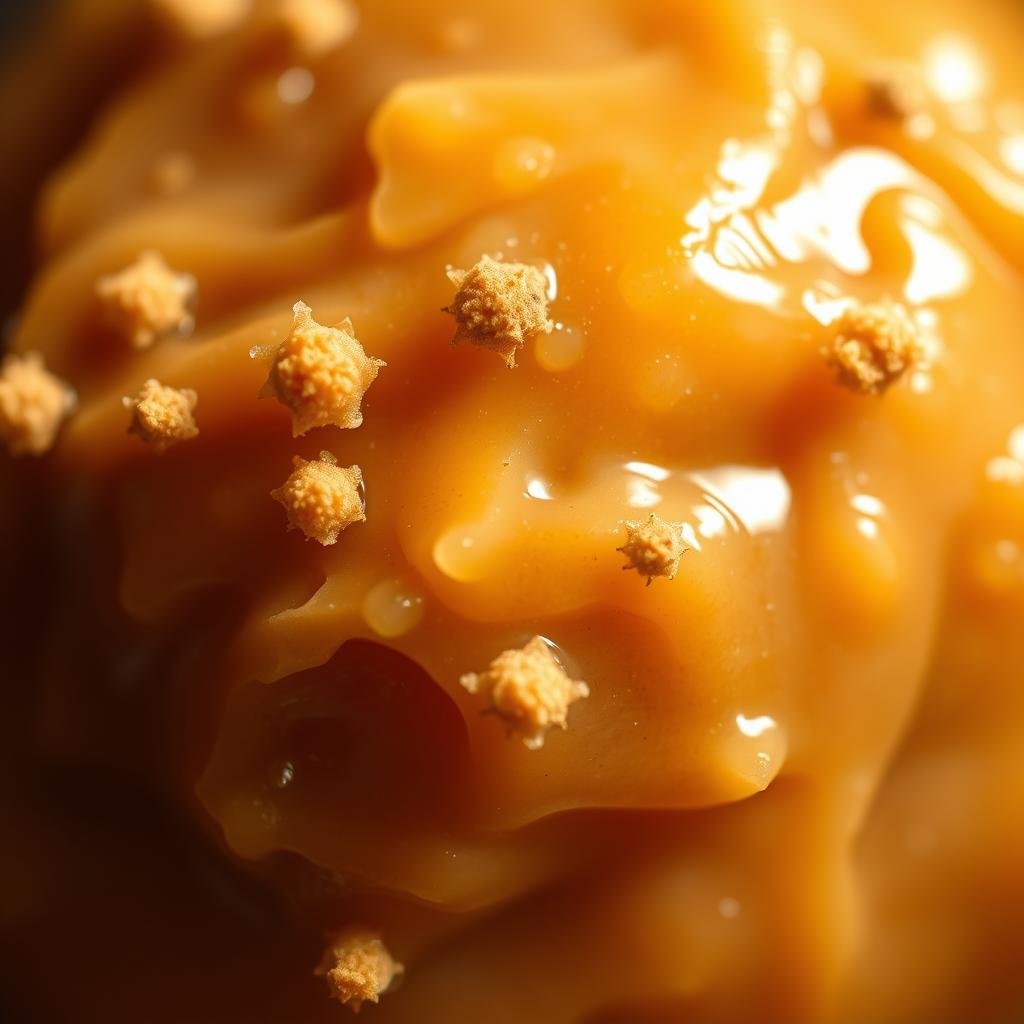
Miso is a traditional Japanese seasoning made from fermented soybeans, salt, and koji. This process makes miso rich in good bacteria. It’s full of protein, fiber, vitamins, and minerals. Miso helps with digestion and keeps gut bacteria balanced.
Eating miso can greatly improve your health. It’s great in soups and sauces. Miso’s good bacteria make it perfect for a healthy diet.
Here’s a look at the nutrient profile of miso:
| Nutrient | Amount per 100g |
|---|---|
| Protein | 12g |
| Fiber | 5g |
| Vitamin K | 29.3 µg |
| Vitamin B2 (Riboflavin) | 0.65mg |
| Iron | 2.5mg |
Miso is full of good bacteria. It’s great for your gut and immune system. Adding miso to your diet can be very beneficial.
Kombucha: The Fermented Tea Drink
Kombucha is a fermented tea loved for its health perks. It’s tangy and bubbly, made with a special mix of bacteria and yeast. This mix makes it taste refreshing and slightly sour.
Benefits and Cautions of Kombucha
Kombucha is great for your gut and immune system. It helps with digestion and can ease constipation and IBS. It also has antioxidants to protect your cells.
But, watch out for its caffeine and alcohol. An 8-ounce serving has 30 calories, 2-3 grams of sugar, and less than 15 milligrams of caffeine. The alcohol is usually under 0.5%. For more info, check out this resource on kombucha.
How to Choose Quality Kombucha
Choosing good kombucha is key for its benefits. Look for “live cultures” on the label. This means it has probiotics for your gut.
Stay away from sugary kombucha. Choose ones with little added sugar. This helps keep your gut healthy. Pick a brand that fits your taste and keeps its probiotics strong. Kombucha is a great choice for a diet full of foods with live cultures and gut-friendly foods.
Pickles: Crunchy and Tangy Probiotics
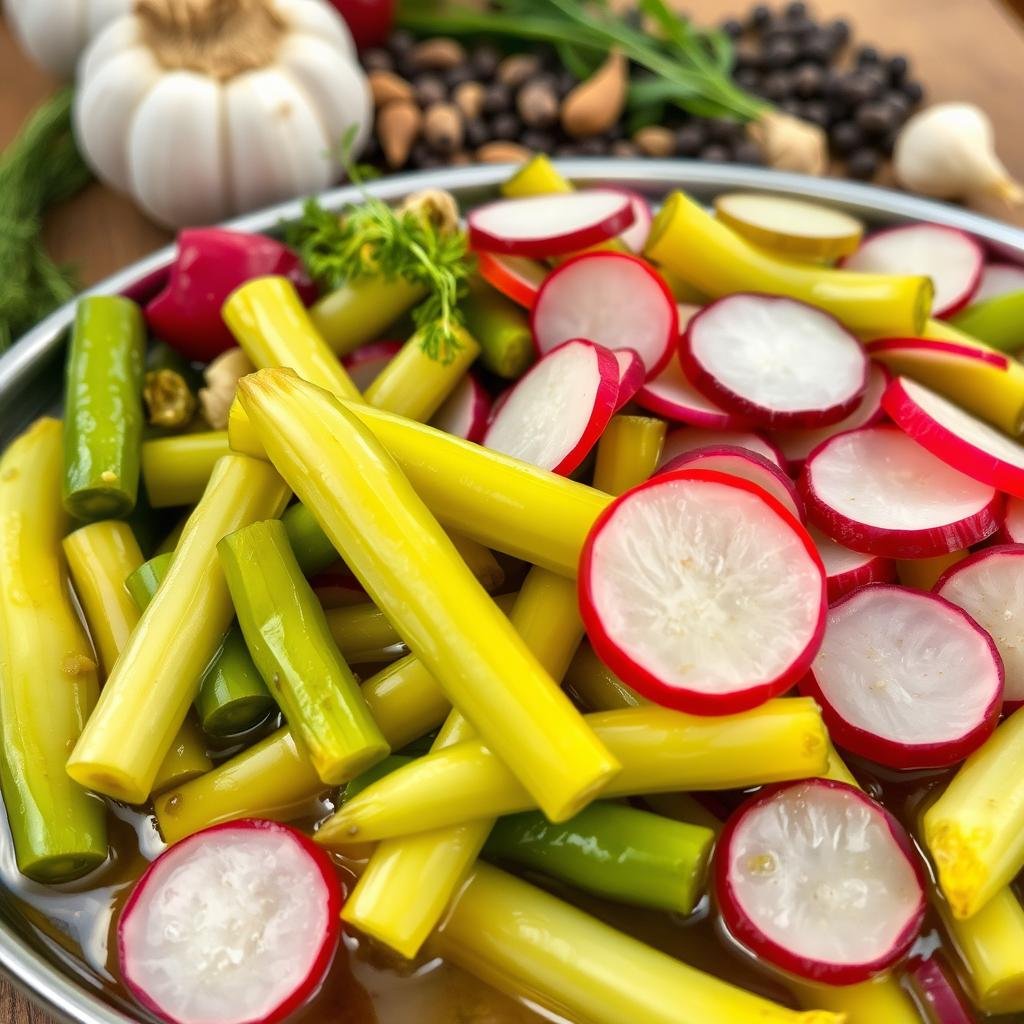
Pickles add flavor and crunch to many dishes. They are cucumbers fermented in salty water. This process creates lactobacillus bacteria, which is good for your gut.
Health Benefits of Pickles
Pickles are a healthy snack choice. They are low in calories but full of vitamin K, which is good for bones. The lactobacilli in pickles also help keep your gut healthy.
Eating pickles can boost your immune system. It also helps your body absorb nutrients better.
Difference Between Pickles Made with and Without Vinegar
Pickles made with vinegar don’t have the same health benefits as fermented ones. Vinegar pickles lack the probiotics found in fermented ones. For better gut health, choose fermented pickles.
To find traditional, probiotic-rich pickles, visit this resource.
Lactobacilli Foods: Key Sources for Strong Immunity
Eating foods rich in lactobacilli is key for a strong immune system. These foods are full of healthy gut bacteria. They help keep your gut balanced and boost your immunity.
Many foods, like yogurt, kefir, sauerkraut, and kimchi, are full of natural probiotics. They fill your gut with good bacteria. This helps with digestion and makes your body stronger.
Adding lactobacilli-rich foods to your diet is easy:
- Yogurt: It’s packed with probiotics, making it great for a balanced gut.
- Kefir: This fermented drink is full of lactobacilli. It’s a great way to get healthy gut bacteria.
- Sauerkraut: It’s a strong source of lactobacilli. It helps keep your gut bacteria in balance.
- Kimchi: Spicy and full of nutrients, kimchi is also a great probiotic source.
Eating these foods regularly can greatly improve your gut health. It also strengthens your immune system.
Incorporating Probiotic-Rich Foods into Your Daily Diet
Adding probiotics to your daily life is easy and tasty. Start with yogurt in the morning. It’s full of live cultures that are good for you.
At lunch, try sauerkraut or kimchi. They’re full of probiotics that help your gut. Pickles are also a great snack to get more probiotics.
Dinner is a good time to add more probiotics to your meal. Miso soup is a great choice. It tastes good and helps your digestion.
Don’t forget about fermented drinks like kefir and kombucha. They’re refreshing and full of probiotics. Start with a little bit and add more as you get used to it.
This way, you can enjoy the health benefits without any stomach problems. Adding these foods to your diet helps your gut and boosts your immune system.

